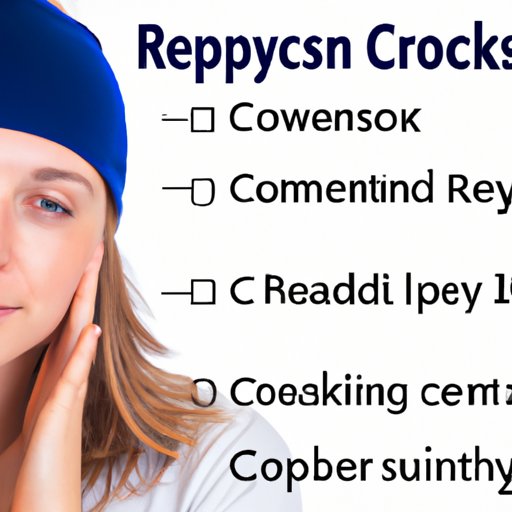
Introduction
If you’ve ever experienced a concussion, you know just how jarring and frightening it can be. Concussions, which are caused by blows to the head or violent shaking, can have serious impacts on an individual’s cognitive function and overall well-being. One question that often comes up in relation to concussion recovery is whether it is safe to go to sleep after sustaining a concussion. In this article, we’ll explore the risks and impacts of sleeping with a concussion and provide tips and guidelines for safe and comfortable sleep during your recovery period.
Sleeping with a Concussion: What You Need to Know
If you’ve recently sustained a concussion, it’s essential to understand the importance of sleep in the recovery process. Sleep is a critical time during which the body can repair itself, and this is especially true for the brain. During sleep, the brain is able to remove toxins and promote the growth of new cells, processes that are crucial for healing and cognitive function. However, when a person has sustained a concussion, there are additional factors to consider that may impact the quality of the sleep they receive.

The Impacts of Sleeping with a Concussion
Sleep can have a significant impact on concussion recovery outcomes. Poor sleep quality or not enough sleep can extend concussion recovery time, and that’s because sleep is vital in the natural healing process of the brain. During sleep, the brain requires essential nutrients and oxygen, and if this process is interrupted due to a concussion, then it leads to slower brain healing and cognitive processes.
A Guide to Sleeping Safely with a Concussion
Sleep is essential for promoting healing and healthy brain function during concussion recovery. But certain positions or poor sleep habits can worsen symptoms and slow down the process of concussion recovery. Here are some tips on how to sleep safely with a concussion:
Recommended Sleep Positions
Sleeping on your back or side is recommended when recovering from a concussion. Avoid sleeping on your stomach because it can stress your neck and head, which can result in worsening of symptoms.
Creating a Conducive Sleep Environment
A dark, cool, and quiet room can facilitate better sleep quality. Remove all electronic devices, such as televisions and phones, which are known to disrupt sleep. Create a comfortable and cozy place to sleep in by using comfortable pillows and bedding.
Do’s and Don’ts of Sleeping with a Concussion
There are specific actions and behaviors that can help improve your sleep quality and support concussion recovery, and others that can hinder it.
Do: Stay Hydrated
Staying hydrated is essential for optimal brain function and overall recovery. Dehydration can worsen symptoms and even cause new ones, such as headaches and nausea.
Don’t: Consume Alcohol or Caffeine Before Bed
Avoid consuming alcohol and caffeine before going to bed, which can both disrupt sleep quality. Alcohol will make you fall asleep quickly but it makes your sleep fragmented in quality. Instead, opt for chamomile tea. or warm milk, which can help induce sleep.
Risks of Going to Sleep with a Concussion
If you do decide to sleep with a concussion, there are potential risks to consider. You might experience symptoms such as dizziness and headaches to worsen, or other complications can occur.
Worsening of Symptoms
Symptoms like dizziness, confusion and nausea are known to worsen during sleep. You might be unaware of such changes till you wake up.
Concussion-related Complications
A concussion can sometimes lead to other complications due to sleep. For example, if you have developed sleep apnea, it might aggravate the concussion symptoms. Also, if there is a loss of balance or coordination, there might be an increased risk of falls during sleep.
Why Sleeping with a Concussion is Dangerous
Concussion symptoms can worsen during sleep because of slow brain activity and reduced brain activity. When a person is in a resting position, their brainwaves slow down, which can lead to the amplification of concussion-related symptoms. For example, headaches and dizziness may become more severe. Therefore, it’s essential to have a proper restful sleep posture while sleeping.
How Proper Sleep Habits Can Aid Concussion Recovery
When it comes to concussion recovery, sleep is crucial. With proper sleep habits, recovery can be much faster and smoother.
How Sleep Promotes Brain Healing
Sleep has a critical role in repairing and restoring the body, including the brain, hence promoting brain healing. During sleep, brain cells repair themselves, and the brain also flushes out harmful toxins that could compromise overall cognitive function.
Other Healthy Sleep Habits That Can Aid Recovery
Aside from creating a conducive sleep environment, staying hydrated, and avoiding alcohol and caffeine, there are other healthy sleep habits that can aid concussion recovery. These include getting enough rest, sticking to a regular sleep schedule, and avoiding daytime naps.
Conclusion
If you’ve recently experienced a concussion, getting enough restful sleep is essential for promoting healing and recovery. With the tips and guidelines outlined in this article, you can enjoy safe and comfortable sleep while minimizing the risks and impacts of sleeping with a concussion. By prioritizing healthy sleep habits and minimizing risk factors, concussion recovery can be quick, safe, and effective.





